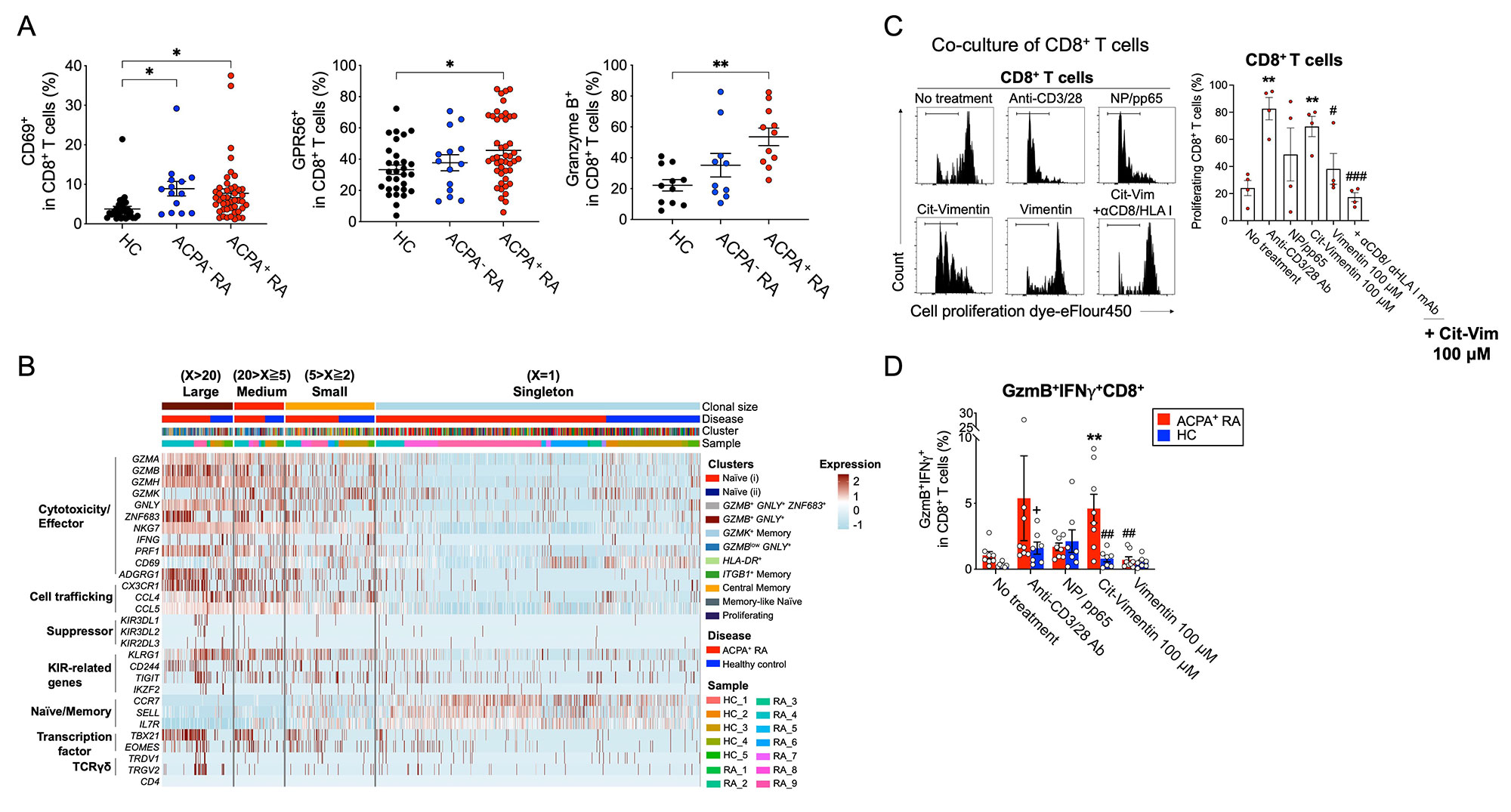Session Information
Date: Monday, November 14, 2022
Title: T Cell Biology and Targets in Autoimmune and Inflammatory Disease Poster
Session Type: Poster Session D
Session Time: 1:00PM-3:00PM
Background/Purpose: Rheumatoid arthritis (RA) is a systemic autoimmune disease associated with MHC polymorphisms. The shared epitope polymorphism in MHC class II genes is by far the strongest genetic association with ACPA+ RA, and the shared epitope polymorphisms have been demonstrated to facilitate the binding and presentation of citrullinated peptides. MHC class I gene polymorphisms are also associated with the susceptibility to seropositive RA. To further investigate the potential role of MHC class I polymorphisms in the pathogenesis of RA, we characterized CD8+ T cell phenotypes and clonality in ACPA+ RA blood using flow cytometric and single cell RNA and TCR sequencing analysis. We also performed in vitro assays to characterize the antigen specificity and functional properties of clonally expanded CD8+ T cells in ACPA+ RA blood.
Methods: We used flow cytometric and single-cell RNA profiling analyses including VDJ sequencing to analyze the effector phenotypes and clonal expansion of CD8+ T cells in ACPA+ RA blood. To investigate the antigen targets of the expanded CD8+ T cells in ACPA+ RA, we performed in vitro protein stimulation in ACPA+ RA peripheral blood mononuclear cells (PBMCs) or whole blood with candidate citrullinated RA antigens. To assess the cytotoxic potential of citrullinated antigen-activated cytotoxic of CD8+ T cells, we used an in vitro MHC-independent cytotoxicity assay.
Results: We identified GZMB+CD8+ subpopulations in ACPA+ RA blood containing large clonal lineage expansions expressing cytotoxic and tissue homing transcriptional programs, and a GZMK+CD8+ memory subpopulation comprised of smaller clonal expansions expressing effector T cell transcriptional programs. We demonstrated citrullinated RA autoantigens presented by MHC class I activate ACPA+ RA blood-derived GZMB+CD8+ T cells to expand, express cytotoxic mediators, and mediate killing of target cells. We also demonstrated that these activated GZMB+CD8+ T cells are present in RA synovium.
Conclusion: Our findings demonstrated that clonally expanded GZMB+ CD8+ T cells are present in ACPA+ RA blood. We further demonstrated that these clonally expanded cytotoxic CD8+ T cells are specific for citrullinated antigens and can mediate cytolytic cell killing. Our findings suggest that cytotoxic CD8+ T cells targeting citrullinated antigens could contribute to synovitis and joint tissue destruction in ACPA+ RA.
To cite this abstract in AMA style:
Moon J, Younis S, Sharpe O, Rao N, Carman J, James E, Buckner J, Deane K, Holers M, Donlin L, Davis M, Robinson W. Clonally Expanded Cytotoxic CD8+ T Cells Recognize Citrullinated Antigens in ACPA+ Rheumatoid Arthritis [abstract]. Arthritis Rheumatol. 2022; 74 (suppl 9). https://acrabstracts.org/abstract/clonally-expanded-cytotoxic-cd8-t-cells-recognize-citrullinated-antigens-in-acpa-rheumatoid-arthritis/. Accessed .« Back to ACR Convergence 2022
ACR Meeting Abstracts - https://acrabstracts.org/abstract/clonally-expanded-cytotoxic-cd8-t-cells-recognize-citrullinated-antigens-in-acpa-rheumatoid-arthritis/

